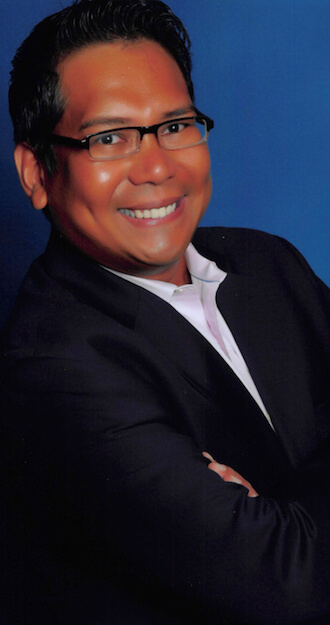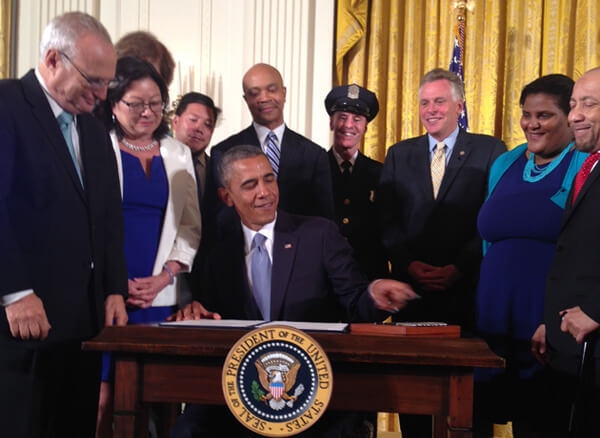Richard Blanco with his extended family in Cuba. | COURTESY: ARIANE SLOAN
President Barack Obama’s recent re-opening of formal diplomatic relations with Cuba has spawned praise and scorn –– and renewed interest by LGBT advocates in the island nation’s human rights record.
Over the past decade, this reporter has written extensively about Cuba for Gay City News, beginning with a report on my 2003 visit there. Most recently, the 2012 New York visit by Mariela Castro, the daughter of President Raúl Castro who as head of the National Center for Sex Education speaks out prominently on LGBT issues there, offered the opportunity to interview a variety of LGBT and other Cubans and Cuban Americans knowledgeable about rights issues.
The most famous LGBT Cuban-American in the world today is Richard Blanco, the poet who wrote and delivered “One Today” at Obama’s 2013 second-term inauguration. He was the first Latino, immigrant, and openly gay writer to hold that position of honor at a presidential swearing-in –– and he was also the youngest, 44 at the time.
Richard Blanco, official poet at 2013 inauguration, “happy” but feels “guilty,” as well
Conceived in Cuba, born in Spain, and raised in Miami, Blanco’s life in many ways shares common threads with that of other Cuban-Americans, and at the same time is worlds apart. His new book, “The Prince of los Cocuyos: A Miami Childhood,” from ECCO Press, recounts his early, formative years.
In an email exchange since the president announced the nation’s new Cuba policy, Gay City News asked Blanco what he thinks of the new openness and what it might mean for Cuba’s LGBT community, for tourism, and for other aspects of life.
Michael Luongo: What is your first impression of the historic change in relations between Cuba and the United States?
Richard Blanco: For years, I had generally thought that normalizing relations with Cuba was a good thing; and I still do, but when that became a real possibility, I realized that the situation is much more complex and layered than I had considered, and my reaction was a bit mixed. I was surprised by that. Mostly because I was craving some guarantee that these changes will indeed lead to greater freedoms and prosperity for the people of Cuba. That’s the real issue for me. Not just the economic embargo, but Cuba’s embargo against democracy. Cuba needs to be held accountable for that, which needs to change as well.
ILLUSTRATION BY MICHAEL SHIREY
Also, I felt somewhat “guilty” about being “happy” about these changes as I began to think of all the struggles, sacrifices, and injustices that my parents and elders in my Cuban community had endured. I felt I needed to respect their experiences and emotions, and that this would not be a slap on their faces, so to speak. It’s all still very complex for me, and I’m still trying to work it out. One thing for sure, however, I intend to be part of healing the “emotional” embargo that has been in effect as well.
There are many stories that need to be shared for reconciliation of Cubans everywhere that have been figuratively divided by the economic embargo and historical animosities — on both sides of the 90-mile fissure that has divided friends and families for generations. There has been a virtual “Berlin Wall” and when that truly comes down, we need to reconcile many more matters of the heart.
ML: Have you visited Cuba as an adult, and if so did you meet other gay people there or talk with activists?
RB: Yes, several times. But I don’t travel to Cuba as a tourist; I travel to see family and I stay with them. Some members of my family are gay, but my sense is that there is no “LGBT community” per se, at least none that I have seen. It’s all very clandestine. There is no such thing as “activists” in the way we understand it in the US.
Keep in mind that Cuba is a totalitarian state — everything is controlled by the government. If you want to really understand what it is/ was like to be a gay man in Cuba, read Reinaldo Arenas, especially his memoir, “Before Night Falls,” which was also adapted into a full length feature film directed by Julian Schnabel.
ML: What do you think this renewed opening in Cuba will mean for LGBT rights in Cuba?
RB: That’s way, way down the pipeline. A lot has to happen with respect to basic freedoms first — like freedom of speech, to name one of many.
Poet Richard Blanco. | JOYCE TENNESON
ML: You read the poem for President Obama’s inauguration. What did it mean for you to be the first immigrant, first Latino, first openly gay person to do so?
RB: Well, this would take a book to answer, and in fact I wrote one: “For All of Us, One Today: An Inaugural Poet’s Journey.” But to sum it up, I understood that my story — like the stories of the hundreds of thousands of people like me (gay, Latino, immigrant) –– had always been a grand part of America. Now we are finally getting the chance to write that story into the narrative of our nation. Though at times it’s tough to do so, I realized that America is still a work-in-progress, and I renewed my faith in American Democracy and our country’s ability to adapt and right the wrongs.
ML: There are only a few openly gay Latino celebrities, with perhaps Ricky Martin the most famous, though he came out late in his career. What is the importance of having out, well known figures in the Latino community?
RB: There are maybe a hand-full of gay role models — and we certainly could use a whole lot more. In Latino communities we are dealing with the construct of “Machismo”— a set of hyper-masculine, Latin-Lover stereotypes that need to be broken down, perhaps more so than in other cultures. I do what I can to lead by example and storytelling so that the “face” of what it means to be a gay Latino man has more dimension and becomes more accepted and commonplace.
ML: Many of us who might have visited Cuba or imagine visiting Cuba think of it as special, locked in amber in the past, and maybe even nostalgically want to keep it that way, different from any other country. Is there something selfish about that? Do you think people who did not see Cuba before this are missing out, or is there no best time to see a place?
RB: This is one of the questions I get asked most often, and, frankly, one of the most annoying. It feels to me akin to saying “I want to visit North Korea before it changes.” Would Americans have said that of the former Soviet Union? Cuba is “locked in amber” not by choice, but because of the lack of choices. For example, the antique cars in Cuba are not a hobby, Cubans need to keep those cars running because they have no alternative for transportation (most of them are refurbished with Soviet car engines).
I encourage people to visit Cuba, but to get off the “tour bus” and try to understand/ see Cuba beyond the mojitos and rumba lines — the façade that the government puts on for tourists. I advise them to go with humanitarian or cultural exchange groups so that they can see more of the “real” Cuba and Cuban people who are in dire circumstances that keep them from changing and who lack freedoms that most of us take for granted.
But on the other hand, if by “change” we’re talking about the dreaded scenario of Cuba someday being overly commercialized with McDonalds and Starbucks on every corner — a Cuba that has lost its authenticity (like so many tourist economy cities and nations) — then yes, go to Cuba now. It is worth seeing now, but with the sensitivity that certain kinds of changes are good and absolutely necessary.
Richard Blanco reviews a copy of his inaugural poem, “One Today,” with President Barack Obama. | PETE SOUZA/ WHITE HOUSE
ML: Tell me more about your new book – your memoir “The Prince of los Cocuyos: A Miami Childhood.”
RB: Where am I from? Where do I belong? Who am I?
These are the universal questions that have always obsessed my writing. And continue to do so in the new memoir. It deals with my cultural coming of age as the child of Cuban immigrants. I grew up in the grip of two imaginary worlds: the Cuba of the 1950s that my family longed for and my idealized fantasy of America from TV shows like “The Brady Bunch,” which offered a life just as “exotic” as the island paradise that was my birthright.
But the memoir also takes a close look at contending with my burgeoning artistic and sexual identities. I wanted to show how all these things collide, intersect, merge into one “story.” I wanted to evoke the complexities and glories — and humor — of that story and of becoming in all these contexts. It is a resonant account of how I came into my own sense of an authentic self, one that incorporated my Cuban-ness and my queerness, my American-ness and my artistic drive; the way in which we are all perpetually shaped by our experiences, our memories, and our stories of community and family.
ML: What was it like coming out to your parents?
RB: I didn’t come out in the memoir because it ends at around age 17. And as such, what I explore in the book is all those thousands upon thousands of “little” moments since we are very young that build up our understanding of ourselves, let us envision our lives as gay men/ women, and finally give us the courage to come out. I came out when I was 25, and I’m happy to report that it was relatively easy. Sure, many in the family were “shocked,” and it took them a few years to come out themselves, so to speak. But mostly because I was one of those men who over-compensated and did a great job of passing as a straight man — always had girlfriends and dated constantly.
Interestingly to me, however, it was the embracing of my Cuban heritage followed by my pursuit of a life in the arts as a poet that bolstered a greater and more authentic sense of self, and in turn gave me the courage to come out. Learning to be true to myself in these other contexts finally allowed me to do the same when it came to my sexuality.
For more information on Richard Blanco, visit richard-blanco.com.






































